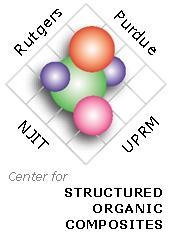Center for Structured Organic Composites starts operating
Submitted on 18 July 2006 - 11:52am
This article is reproduced by CienciaPR with permission from the original source.

Cited from RUM's Chemical Engineering
This Engineering Research Center (ERC) is funded by a $15 million, five-year grant from the National Science Foundation (NSF), with the option of a five year extension.
“The five-year grant funds an NSF Engineering Research Center (ERC) to enhance the quality and consistency of materials used in drug tablets, processed foods, agrichemicals and other composite organic products. Research will focus on the structure of component materials, including particle shapes and sizes and forces that bind them together. The center also will study how to efficiently produce structured materials in large quantity. Understanding the nature of these materials will provide a foundation for new manufacturing processes that are more predictable, consistent and cost-effective.”
“In addition, 28 companies are providing $2.5 million in research funding during the ERC’s first year. The consortium expects to bring in as much as $40 million in additional support over the next 10 years.”
“The ERC also expands a five-year, $3.2 million doctoral training program in nanopharmaceutical engineering that the NSF awarded Rutgers, NJIT and Puerto Rico in 2005. That grant is part of the NSF’s Integrative Graduate Education and Research Traineeship (IGERT) program, which provides interdisciplinary training to scientists and engineers pursuing doctorates in fields with broad societal impact. Graduate students in the Rutgers-led IGERT will develop nanoparticle-based drug delivery systems, including nanoparticle product and process design.”
“Beyond pharmaceutical tablets, the team’s work could be applied to food products, agrichemicals, and catalysts. By lowering the cost of pharmaceutical product development, the ERC’s research could play a substantial role in providing medicines to third-world populations. Processed foods could be made more effective at delivering essential nutrients. And in the agrichemical business, it could help deliver fertilizers, fungicides and pesticides more directly to crops and reduce contamination to handlers and the environment.”
“ERCs conduct pioneering research in emerging technologies and train the next generation of engineers. Each center, while based at a university, is a collaborative partnership, drawing together individuals and resources from other universities, industry partners, and pre-college teachers and students. The maximum possible duration of NSF support is 10 years, after which the ERCs are expected to become self-sufficient.”
Lead investigators on the grant from collaborating institutions are Rajesh Dave at NJIT in Newark, Gintaras Reklaitis and Kenneth Morris at Purdue University in Lafayette, Ind., and Carlos Velazquez at the University of Puerto Rico in Mayagüez and CienciaPR member.
For more information visit Dept. of Chemical Engineering, RUM







